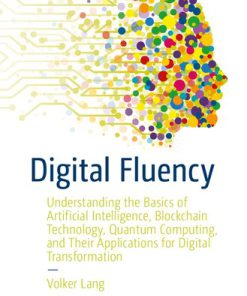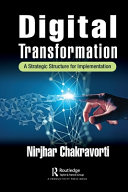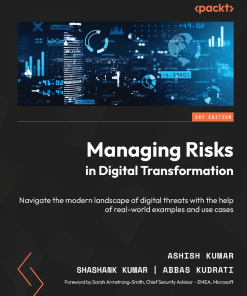Managing Digital Transformation Understanding the Strategic Process 1st Edition by Andreas Hinterhuber, Tiziano Vescovi, Francesca Checchinato 0367441977 9780367441975
$50.00 Original price was: $50.00.$25.00Current price is: $25.00.
Managing Digital Transformation Understanding the Strategic Process 1st Edition by Andreas Hinterhuber, Tiziano Vescovi, Francesca Checchinato – Ebook PDF Instant Download/Delivery: 0367441977, 9780367441975
Full download Managing Digital Transformation Understanding the Strategic Process 1st Edition after payment

Product details:
ISBN 10: 0367441977
ISBN 13: 9780367441975
Author: Andreas Hinterhuber, Tiziano Vescovi, Francesca Checchinato
This book provides practising executives and academics with the theories and best practices to plan and implement the digital transformation successfully. Key benefits: an overview on how leading companies plan and implement digital transformation interviews with chief executive officers and chief digital officers of leading companies – Bulgari, Deutsche Bahn, Henkel, Lanxess, L’Oréal, Unilever, Thales and others – explore lessons learnt and roadmaps to successful implementation research and case studies on the digitalization of small and medium-sized companies cutting-edge academic research on business models, organizational capabilities and performance implications of the digital transformation tools and insights into how to overcome internal resistance, build digital capabilities, align the organization, develop the ecosystem and create customer value to implement digital strategies that increase profits Managing Digital Transformation is unique in its approach, combining rigorous academic theory with practical insights and contributions from companies that are, according to leading academic thinkers, at the forefront of global best practice in the digital transformation. It is a recommended reading both for practitioners looking to implement digital strategies within their own organisations, as well as for academics and postgraduate students studying digital transformation, strategy and marketing.
Managing Digital Transformation Understanding the Strategic Process 1st Table of contents:
Part 1 Introduction
Chapter 1 Digital transformation: An overview
The structure of the book
References
Part 2 Digital transformation and organizational capabilities
Chapter 2 Understanding digital transformation: A review and a research agenda
Introduction
Methods
Findings
Defining digital transformation
Digital transformation: an inductive framework
The nature of digital technologies
Digital technologies as sources of disruption
Altering consumer behavior and expectations
Disrupting the competitive landscape
Increasing the availability of data
Strategic responses to digital disruption
Leveraging digital technologies to uncover new paths for value creation
Transforming the value creation process
Value propositions
Value networks
Digital channels
Agility and ambidexterity
Structural changes required for changing the value creation process
Organizational structure
Organizational culture
Leadership
Employee roles and skills
Barriers to changing the value creation process
Inertia
Resistance
Assessing the impacts of digital transformation
Organizational level impacts
Operational efficiency
Organizational performance
Higher-level impacts
Positive impacts
Undesirable outcomes
Digital transformation and IT-enabled transformation
Digital transformation: a research agenda
Avenue 1: how dynamic capabilities contribute to digital transformation
Building organizational dynamic capabilities for digital transformation
The role of integrative capabilities to support digital platforms and ecosystems
Microfoundations of dynamic capabilities: how digital transformation unfolds in practice
Avenue 2: the strategic relevance of ethics in digital transformation
Ethics and the multilevel nature of digital transformation
Sustaining organizational performance: the role of ethical performance
Using ethics to account for the conflicting demands of value co-creators
Limitations
Conclusion
Acknowledgments
References
Chapter 3 The three pillars of digital transformation: Improving the core, building new business models, and developing digital capabilities
Chapter 4 Big data and analytics: Opportunities and challenges for firm performance
Introduction
Big data and analytics
Methodology
Analysis and results
Decision-making process
Education and training
Risks and barriers
Tools of implementation
Concluding remarks
References
Chapter 5 Technology is just an enabler of digital transformation: Interview with Gianfranco Chimirri, HR communication director of Unilever Italy
Introduction
Discussion of the case and final remarks
Part 3 The digital transformation and business model innovation
Chapter 6 Digital transformation and business models
Digital transformation leads to new business models
Different types of digital business models
Areas of business change
Difficulties and problems in changing the business model
The pathway to a digital business model
Conclusions
References
Chapter 7 From disruptively digital to proudly analog: A holistic typology of digital transformation strategies
Digital transformation is everywhere
Taking the big picture
Tastiest ingredient and master recipe for digital transformation
Digital technologies
Business models
A holistic typology of digital transformation strategies
Type 1: disruptive digital transformation
Type 2: business model led digital transformation
Type 3: technology led digital transformation
Type 4: proud to be analog
Toward more solid conceptual ground
Acknowledgments
Note
References
Chapter 8 Digital transformation, the Holy Grail and the disruption of business models: Interview with Michael Nilles, Chief Digital and Information Officer, Henkel
Acknowledgments
References
Chapter 9 How artificial intelligence and the digital transformation change business and society: An interview with venture capitalist Vinod Khosla
Acknowledgements
Reference
Chapter 10 The digital company culture: Interview with Luca Ferrari, CEO, Bending Spoons
Summary
Chapter 11 Consulting for digital transformation: Interview with Giuseppe Folonari, European Head of Business Strategy, AKQA
The company
Chapter 12 L’Oréal digital consumer operating system
Introduction
2010s’ rapid beauty consumer digitization
History of digital beauty innovation
Consumer digitization at mass scale: smartphones, digital platforms
Unconventional new normal: new contents, new talents, new brands
Lower barriers to entry for DNVBs
Consumer-centricity: eCommerce, personalized relationships, brand love
Pointing to the magnetic north
New beauty consumer digital operating system
Horizon: eCommerce, personalized consumer relationships, love brands
People powered: digital expertise and upskilling
Inflow of senior leadership veterans from GAFAM, agencies and start-ups
Enabling marketing and sales organizations: 2000 experts, 33,000 upskilling
Digital first management rituals
Pilot–proof–publicize–replicate approach to scale fast
Software has eaten FMCG: new specialty skills required
New competitive advantage: critical mass of skills on the frontline
Scale-up method: pilot–proof–publicize–replicate
Case study: precision advertising
2017: digital media attention surpasses TV attention
Media ROI digital challenge
Pilots to develop precision advertising prowess
Precision advertising transformation results
Technology factories and economies of scale
KPI monitoring
Web, eCommerce and services
eCommerce and digital contents backbone
References
Chapter 13 Internal start-ups as a driving force in the digitalization of traditional businesses: Interview with Jörg Hellwig, Chief Digital Officer, Lanxess
Part 4 Digital transformation and customer value creation
Chapter 14 Digital transformation and consumer behaviour: How the analysis of consumer data reshapes the marketing approach
Introduction
Technological developments and their impact on consumer behaviour
Consumer data and data-driven marketing
From consumer data to the marketing strategy
Digital technologies impact on the customer–company relationship
Effects on marketing strategy3
Conclusions
Notes
References
Chapter 15 Digital transformation and the salesforce: Personal observations, warnings, and recommendations
What is digital transformation?
Is the digital offer typically a complement to or substitute for traditional products?
How does digital transformations affect the salesforce?
Increasing selling time
Monitoring online/offline interactions
How do digital products and services affect pricing?
What are obstacles to successful implementation of a digital transformation?
What advice for companies beginning a digital transformation journey?
Selling is about buying
Focus on helping the average rep improve
Beware the silos
References
Chapter 16 Digital transformation and the role of customer-centric innovation: Interview with the chief value officer, Thales
References
Chapter 17 Digital transformation in luxury industry: Interview with Jean-Christophe Babin, CEO Bulgari
Chapter 18 The importance of data in transforming a traditional company to a digital thinking company: Interview with Fabrizio Viacava, chief digital officer of Etro
Introduction
Conclusion and final remarks
Part 5 The digital transformation in SMEs: challenges and best practices
Chapter 19 Digital transformation of manufacturing firms: Opportunities and challenges for SMEs
Digital transformation
The concept of digital transformation
Drivers, impacts and transformed areas
Stages of digital change
Dynamic capabilities, new business models and digital transformation
Dimensions of digital transformation, readiness and maturity
Managing digital transformation
Conclusions on the digital transformation
The nine technological pillars of Industry 4.0 and their impact
Additive manufacturing
Autonomous robots
Augmented reality
Cloud computing
Simulation
Industrial Internet of Things
Big data and analytics
Cybersecurity
Horizontal and vertical system integration
Human resource management and development in Industry 4.0
A qualitative research approach to Italian SMEs in Industry 4.0
Methodology
Firms in the sample
Company A
Company B
Company C
Company D
Results
Adoption of Industry 4.0 technologies
Management challenge of Industry 4.0
Findings
References
Chapter 20 Digital transformation and financial performance: Do digital specialists unlock the profit potential of new digital business models for SMEs?
Introduction
Digital transformation, digital specialists, and digital performance
Digital transformation and business model change
Digital specialists
Digital transformation, digital specialists, and financial performance
Digital transformation and financial performance
Roles and impact of digital specialists
Methodology
Data
Measures
Measurement validation
Response and common method bias
Results
Discussion
Managerial implications
Limitations and future research
Notes
References
Chapter 21 Supporting pervasive digitization in Italian SMEs through an open innovation process
Understanding digital transformation and its implementation
The multi-stakeholder digitization process in Venice
The project data
Empirical findings and discussion
Enablers
Barriers
References
Part 6 Conclusion
Chapter 22 Our roadmap to digital transformation
People also search for Managing Digital Transformation Understanding the Strategic Process 1st:
7 pillars of digital leadership
7 transformations of leadership pdf
six sigma digital transformation
6 digital marketing strategies
Tags:
Andreas Hinterhuber,Tiziano Vescovi,Francesca Checchinato,Managing,Digital
You may also like…
Computers - Computer Science
Business & Economics - Management & Leadership
Business & Economics - Management & Leadership
Business & Economics - Project Management
Business & Economics - Management & Leadership
Strategic Change and Transformation Managing Renewal in Organisations 1st Edition Swarup Kumar Dutta
Business & Economics
Computers - Information Systems
Managing Risks in Digital Transformation 1st Edition by Ashish Kumar 9781803234144 1803234148
Uncategorized











